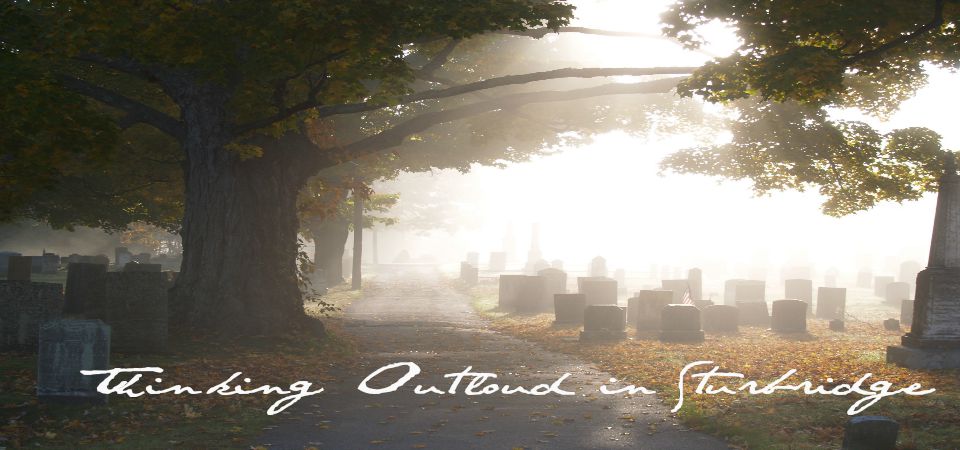Sixty miles west of Boston, Massachusetts there is the small New England town of Sturbridge. Located at the junction of I-90 (The Mass Pike), and I-84 it has become known as the "Crossroads of New England". The town was first settled over 300 years ago, and like other small New England towns it has grown just enough over the years to be in a difficult place today. How do we embrace the future without forgetting how we got to our present? How do we attract the right kind of growth, and maintain who we are? And, what about our culture out here in Central Massachusetts?
These pages will cause one to think about how to protect what we have, our future direction, and how to move on in the very best way.
Those thoughts, and other ramblings, will hopefully inspire more thought, conversation, action, and occasionally a smile...
...seems to be working so far
Saturday, March 7, 2009
Just Have To Get This Off My Chest
This is far, far different than when I first started out in this field of nursing. Back then, it was every other weekend, 40 hours a week, and my schedule required that I work seven days on, two off, three on , two off and repeat ad infinitum.
In a word, it sucked.
Nowadays, things are very different, but I still see that some hospitals still have an "every other weekend" obligation, and only 8 hour shifts. Those working conditions are "so 1980's".
Hospitals still complain that attracting nurses, and keeping them on board is an issue.
Well, duh.
Nurses today are looking for working conditions to fit their lifestyle, not a lifestyle to fit their working conditions, and they do find it. The places they choose not to work at then continue to suffer the perpetual short staffing. Where I work we are staffed well. Oh, there may be an empty spot here and there, but overall staffing is very good.
We commit to three twelve hour shifts each week, and that is considered Full Time. All the benefits on those 36 hours are Full time benefits, and we have four days off each week. Not bad. Not bad at all.
Yes, twelve hour shifts can be tiring at times, depending on whats happening, but the flexibility the schedule gives is great. If one would like to pick up an extra day now and again to pay for vacation, tuition, or that new car, it is easy to do, and the hospital doesn't have to hire a slew of per diem staff.
Compensation is always a main concern for those of us in nursing. Historically, the further west you worked in Massachusetts, the less you would earn. It is the same today even though the cost of living 60 miles west of Boston is now the same as it is in Metro West. When I left Boston a few years ago after moving to Sturbridge, I took a job out Springfield way. Big mistake. Huge mistake. Not only are they two decades behind the times in their basic nursing care, but the compensation was 35-40% less than I was making in Boston.
So, today I am writing this to all those nursing managers, and hospital human resource folks out there. If you want to fix a staffing problem, learn to be flexible. Compensation is important, but flexibility is by far something that will secure more candidates for those open positions. It is time for the hospitals to enter the 1990's. Twelve hour shifts enable facilities to hire less nurses, pay for less benefits, and deal with a lesser turn over. These are all key pieces to the recruit and retain strategy.
Unfortunately, I don't see things changing for most of those hospitals that are still hanging onto old ideas like working every other weekend. I haven't done that in fourteen years. Of course, not working weekends would be ideal, but for the position I am in, and enjoy, it is a small sacrifice to pay.
Currently, government, and health care are the only two areas that are not seeing massive layoffs, but that may change soon. Beth Israel Deaconess Hospital in Boston has a $20 million dollar short fall at the moment, and layoffs are on the table. Other hospitals are close to having to make a similar decision as well. We laid off a few in January.
If a hospital can cut its costs with simple changes in policies, it should do it now. Today. Otherwise, those in the community that rely on that hospital being there, just down the street, may be very disappointed in the next couple of years as the smaller, community hospitals fade away. The number of small hospitals that have closed their doors for good in Massachusetts in the last 20 years is staggering.
So, there you have it, a bit of health care consulting free of charge. If you were a client, I would charge a lot more.
Never ignore good free advise. If you do, then maybe you should have your head examined, that is if you can find a place that is still open, and has the staff to do it.

No comments:
Post a Comment
Anonymous comments not accepted, and will be rejected. Please use your full name. Choose "Name / URL" and enter your name, and your name ONLY. Leave "URL" blank.